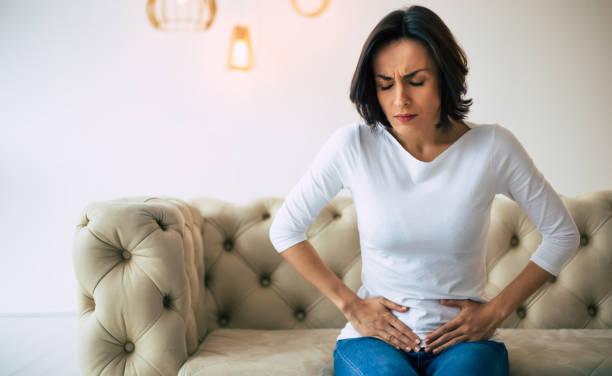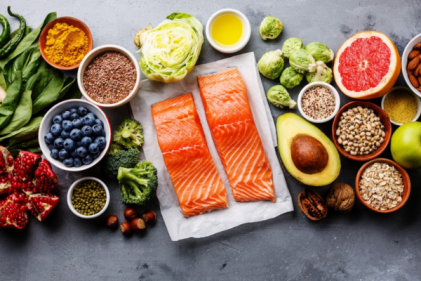Kiran Rahim, a doctor specialising in baby, child, adolescent and women’s health shares the most ridiculous period myths she has heard and warning signs you need to know as endometriosis month comes to a close.
Kiran spoke on behalf of Active Iron, about the most ridiculous period myths she has heard during her extensive medical career, period symptoms that should never be ignored, and other pressing topics related to women’s health including solutions to your biggest period problems.

According to Dr Rahim, these are the period symptoms that women should never ignore:
Painful period poops:
No one really talks about period poops. So if you are having very painful period poops, it's really important you discuss that with the doctor because it can be a sign of something else going on, like endometriosis for example.
Heavy bleeding:
Many women think that having heavy periods where they flood their tampons or their towels or they leak through or pass large clots is normal, but it isn't. If you are having very heavy periods, it's really important you discuss it with the doctor.
Bleeding between periods:
This is almost never normal and should be seen by a healthcare professional as soon as possible.
Symptoms such as fever, feeling nauseous or severe tummy pain should not be ignored. These can be a sign of an untreated pelvic infection or a sign of pelvic inflammatory disease.
Changes in your period:
This needs to be investigated because it can be a sign of polycystic ovarian syndrome, thyroid issues or endometriosis.
Breast tenderness:
A lot of women, particularly young women, aren't used to examining their breasts. There are normal breast changes that happen when you're on your period and throughout the cycle. So if you get to know your breasts through your cycle, you can know what's normal and what isn't for them. Any sort of pain or lumps or tenderness outside of your norm should be discussed. There is no shame in any period symptoms and seeking help is key.
 Endometriosis Awareness Month reminds us that we are not alone
Endometriosis Awareness Month reminds us that we are not aloneHow much blood do women actually lose on their periods?
Women think they use litres and litres of blood. But actually, most women lose somewhere between 2 to 5 tablespoons in their cycle, which is on average around 30 to 50 mls of blood. Depending on the length of your cycle, you may be on the lower end of that or on the higher end. Anything above this is abnormal. So if you are flooding every day for days on end and if you're having to go through multiple period products, then it's really important that you have a chat with your doctor.
What age is most important for women to take iron supplements?
Your need for iron supplementation changes throughout your life. Iron supplementation is important for any woman that is menstruating at any age. It's really important that women take this because menstruation is one of the leading causes of low iron levels in the world. It's important women know how that can affect them and how it can make them feel.
Women that are breastfeeding should consider taking an iron supplement, there's an increased demand on your body when you're breastfeeding. During the perimenopausal phase your periods can become quite irregular and heavy which can lead to low iron levels.
Gentle and clinically proven iron supplements such as Active Iron are a good solution during this time.
How does low iron affect women?
Menstruation is the leading cause for low iron in the world. Iron is an essential nutrient, and it's responsible for a whole host of bodily functions. Maintaining our energy levels, supporting our mental health, and our mood, but also it also supports a lot of the intrinsic processes. So when you have low iron or you don't have enough iron you can be very fatigued, have a lot of brain fog, your mood can be affected, and you can have low energy levels.
And if you're someone who is perimenopausal or having lots of heavy periods, then these symptoms are just that much worse and they don't need to be. Women think that we have to put up with a number of things because that's accepted as a societal norm.
Does every woman need to take iron? And how much iron should they be taking?
Iron is an essential nutrient, and it's responsible for lots of important functions. And on average, women need up to 18mg of iron per day if they are having regular periods. This includes women who are menstruating or perimenopausal. Supplementation, for the most part, is a safe and effective way to replace lost iron.
The issue with conventional iron treatment is that they often come with undesirable side effects. A lot of women complain of heartburn, constipation, and nausea. This is why I love working with Active Iron. Active Iron has really helped me when I was pregnant and struggling with my iron levels and even now. It helps avoid side effects and is so much gentler on our gut. Apart from supplementation, it's really important that you think about having a balanced diet as well, because as we know, diet is also key.
And what are some of the most ridiculous period myths you've heard?
In the South Asian community growing up, I heard a lot, and this makes things really difficult for women when they're on their period. So I guess the worst one for me was that you were told you couldn't wash your hair. It was the most ridiculous one I've seen with absolutely no sense in it. When we were growing up, we were also told that we couldn't swim during our periods because if we went swimming, the chlorine would go inside us and enter the womb and cause lots of infections or again, infertility.
More modern ones are myths like you shouldn't or should exercise during your period - this is not a real thing. The one that I find really difficult is that periods are all shameful and they aren't a normal biological process. The more we normalise them and the more we treat them as such, it empowers young girls and women to come in, talk about their menstrual health, fight some of that stigma, and make women's health better.
You talk about the period myths you heard growing up in the south Asian community, is there anything you would suggest to help combat these myths and help women in general?
Yes, I do. I think the government needs to start speaking to actual women. The difficulty is that there are so many policies made for women by men that don't have an idea of what women go through, particularly on their period. We need a wider practice in thinking about how we in the UK and Ireland can end period poverty. For example, how we can improve women's wellness, women's education around their periods, and indeed around women's health. A lot of things are brushed under the carpet or noted as a ‘taboo topic’ and there's a lot of stigma attached to it. We need to fight against that stigma.
There are particular communities that sometimes are described as being ‘hard to reach’. Usually, black or brown ethnic minority communities and these communities have a lot of stigma and social taboos associated with their parents. But it's really important that women from these communities talk about their health with someone that they trust because there is a lot of misinformation and bad practices that are instilled within communities as being the norm for women's health. I think it's really important that we start to move on areas and start discussing women's health globally.
Do you think that the UK and Ireland do enough for women in regard to general period supports?
No is the short answer. The UK and Ireland don’t do enough for women's health, full stop, and that's certainly been the case for the decade.
Periods are still seen as a shameful taboo thing that shouldn't be talked about, particularly in the workplace. But that needs to change. Our leaders really need to think about things like compassionate leave and understand that good menstrual health is an essential component of female wellbeing. Women bring so much to the workplace, employers need to be flexible. They need to incorporate women's wellness into their policies. Workplaces need to consider giving women dignity during that period so they're not having to hide in toilets crying because they're having awful, painful period cramps or they're not having to run away because they've had a leak or they flooded. It's not a taboo topic. It's a normal biological process and we should treat it as such.








